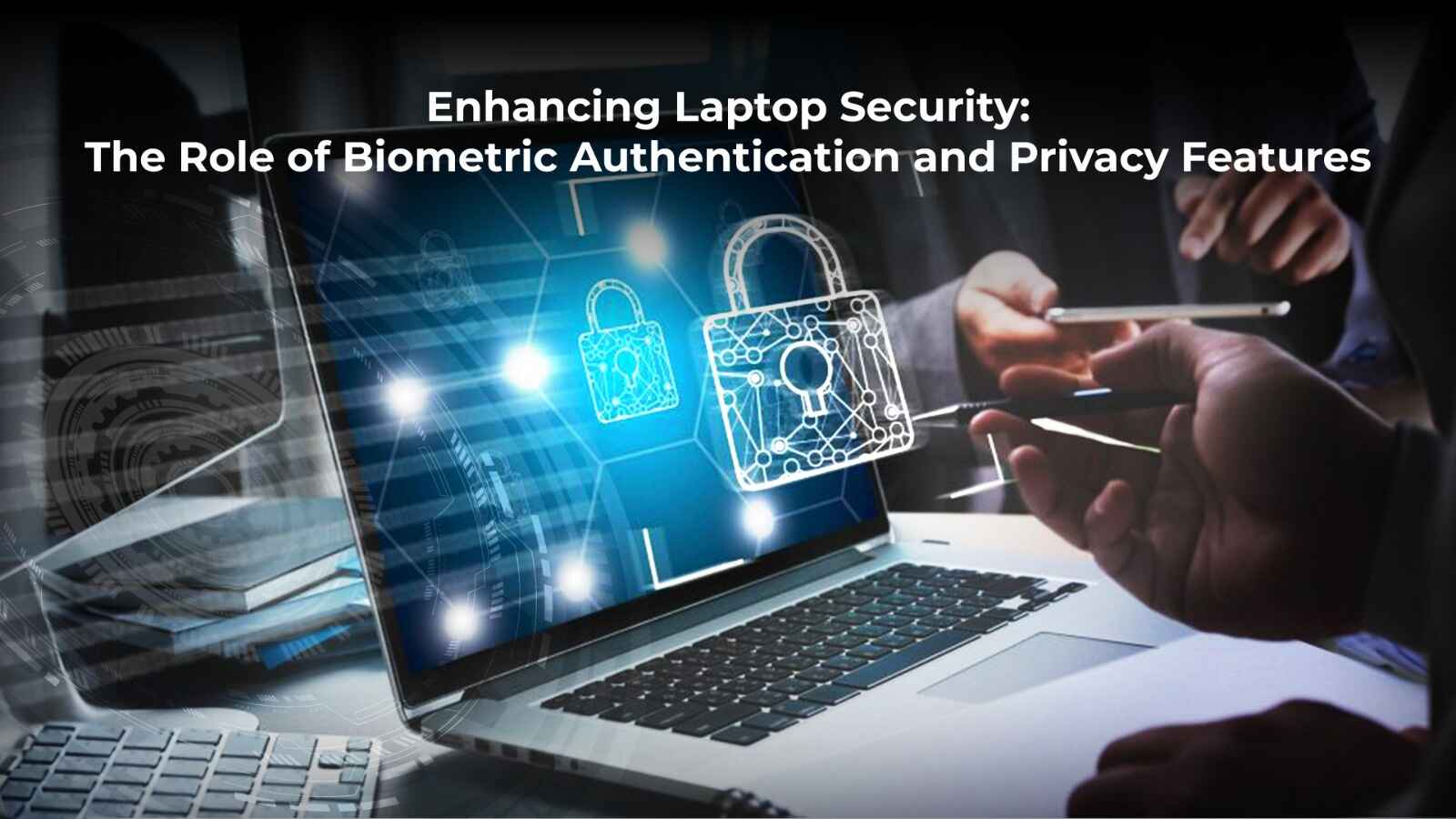In today’s digital age, ensuring robust laptop security is imperative to safeguard sensitive data from cyber threats. Traditional security measures, such as passwords, are increasingly proving insufficient in the face of sophisticated attacks. However, the integration of biometric authentication and privacy features offers a promising solution to enhance laptop security effectively. This article explores the pivotal role of biometric authentication and privacy features in fortifying laptop security, encompassing various keywords such as laptop security, biometric authentication, privacy features, cybersecurity, identity verification, passwordless authentication, data protection, biometric sensors, fingerprint recognition, facial recognition, iris scanning, user privacy, authentication methods, digital security, and cyber threats.
Laptop Security:
Laptop security is paramount in protecting devices and data from cyber threats. With the proliferation of digital technologies, ensuring robust security measures has become increasingly complex. Traditional methods like passwords are prone to hacking, phishing, and other cyberattacks. However, integrating advanced security measures is essential to mitigate these risks and safeguard sensitive information stored on laptops.
Biometric Authentication:
Biometric authentication represents a significant advancement in identity verification methods. By leveraging unique physical characteristics such as fingerprints, facial features, or iris patterns, biometric authentication offers a highly secure and personalized means of authenticating users. Unlike passwords, biometric identifiers are difficult to replicate, enhancing the overall security posture of laptops. With the integration of biometric sensors, laptops can accurately verify user identities, thereby reducing the risk of unauthorized access.
Privacy Features:
Privacy features play a crucial role in protecting user data and preserving privacy rights. Biometric authentication offers inherent privacy advantages over traditional password-based methods. Biometric data, such as fingerprints or facial scans, is stored locally on the device and encrypted, minimizing the risk of data breaches or unauthorized access. Furthermore, stringent privacy measures ensure that biometric data is securely managed and used only for authentication purposes, enhancing user trust and confidence in laptop security.
Cybersecurity:
Cybersecurity encompasses strategies and technologies aimed at protecting devices, networks, and data from cyber threats. With the increasing sophistication of cyberattacks, ensuring robust cybersecurity measures is essential to mitigate risks and safeguard sensitive information. Biometric authentication, coupled with advanced encryption techniques and proactive security measures, strengthens the overall cybersecurity posture of laptops, reducing vulnerabilities and enhancing resilience against emerging threats.
Identity Verification:
Identity verification is a critical aspect of laptop security, ensuring that only authorized users can access sensitive data and resources. Biometric authentication provides a reliable and accurate means of verifying user identities, significantly reducing the risk of identity theft or unauthorized access. By leveraging unique biometric identifiers, laptops can authenticate users with precision, enhancing security and mitigating the risk of credential-based attacks.
Passwordless Authentication:
Passwordless authentication offers a convenient and secure alternative to traditional password-based methods. By eliminating the need for passwords altogether, biometric authentication streamlines the authentication process, reducing the risk of password-related security incidents such as phishing attacks or password theft. With features like fingerprint recognition, facial recognition, and iris scanning, users can securely access their laptops without the hassle of remembering complex passwords, enhancing user experience and security simultaneously.
Data Protection:
Protecting data is crucial to prevent unauthorized access or disclosure of sensitive information. Biometric authentication, coupled with robust encryption techniques, ensures that data stored on laptops remains secure and protected from cyber threats. By incorporating data protection measures into laptop security protocols, organizations and individuals can mitigate the risk of data breaches and safeguard confidential information effectively.
Biometric Sensors:
Biometric sensors play a crucial role in capturing and processing biometric data for authentication purposes. These sensors are integrated into laptops to enable features such as fingerprint recognition, facial recognition, and iris scanning. By accurately capturing biometric information, these sensors enhance the reliability and accuracy of biometric authentication, thereby strengthening laptop security and mitigating the risk of unauthorized access.
Fingerprint Recognition:
Fingerprint recognition is one of the most widely used biometric authentication methods, offering a highly accurate and reliable means of verifying user identities. Integrated fingerprint sensors enable users to authenticate themselves by simply scanning their fingerprints, eliminating the need for passwords and enhancing security. Fingerprint recognition technology is widely adopted in laptops and other devices, offering a seamless and convenient authentication experience for users.
Facial Recognition:
Facial recognition technology enables laptops to authenticate users based on their facial features. By analyzing facial characteristics such as the shape of the face, eyes, nose, and mouth, facial recognition systems can accurately verify user identities. Facial recognition offers a convenient and secure authentication method, particularly in environments where fingerprint scanning may not be feasible. With advancements in facial recognition technology, laptops can provide robust security while ensuring user convenience.
Iris Scanning:
Iris scanning is a highly secure biometric authentication method that analyzes the unique patterns in the iris of the eye. Integrated iris scanners capture high-resolution images of the iris, which are then compared against stored biometric templates for authentication purposes. Iris scanning offers a highly accurate and reliable means of verifying user identities, making it ideal for applications where stringent security measures are required. With the integration of iris scanning technology, laptops can provide enhanced security while maintaining user privacy and convenience.
User Privacy:
User privacy is a fundamental consideration in laptop security, ensuring that personal information remains confidential and protected from unauthorized access. Biometric authentication offers inherent privacy advantages over traditional password-based methods, as biometric data is unique to each individual and difficult to replicate. By storing biometric data locally on the device and implementing stringent privacy measures, laptops can ensure that user privacy rights are upheld while maintaining robust security protocols.
Authentication Methods:
Authentication methods play a crucial role in verifying user identities and controlling access to sensitive data and resources. Biometric authentication offers a highly secure and reliable authentication method, enabling laptops to accurately verify user identities based on unique physical characteristics. With features such as fingerprint recognition, facial recognition, and iris scanning, laptops can provide multiple authentication methods to suit the preferences and requirements of users, enhancing security and usability.
Digital Security:
Digital security encompasses strategies and technologies aimed at protecting digital assets, including devices, networks, and data, from cyber threats. Biometric authentication plays a crucial role in enhancing digital security by providing a highly secure and reliable means of verifying user identities. By integrating biometric authentication and privacy features into laptop security protocols, organizations and individuals can mitigate the risk of cyberattacks and safeguard sensitive information effectively.
Cyber Threats:
Cyber threats pose significant risks to laptop security, encompassing a wide range of malicious activities such as hacking, malware, phishing, and data breaches. With the increasing sophistication of cyberattacks, ensuring robust security measures is essential to mitigate risks and protect sensitive information. Biometric authentication offers an effective defense against cyber threats by providing a highly secure and reliable means of verifying user identities, reducing vulnerabilities and enhancing resilience against emerging threats.
Conclusion,
The integration of biometric authentication and privacy features plays a crucial role in enhancing laptop security, mitigating cyber threats, and protecting sensitive information. By leveraging advanced technologies and robust security measures, laptops can provide a secure and convenient authentication experience while upholding user privacy rights. With the proliferation of cyber threats in today’s digital landscape, adopting biometric authentication and privacy features is essential to safeguarding laptop security and preserving user trust and confidence in the digital environment.





